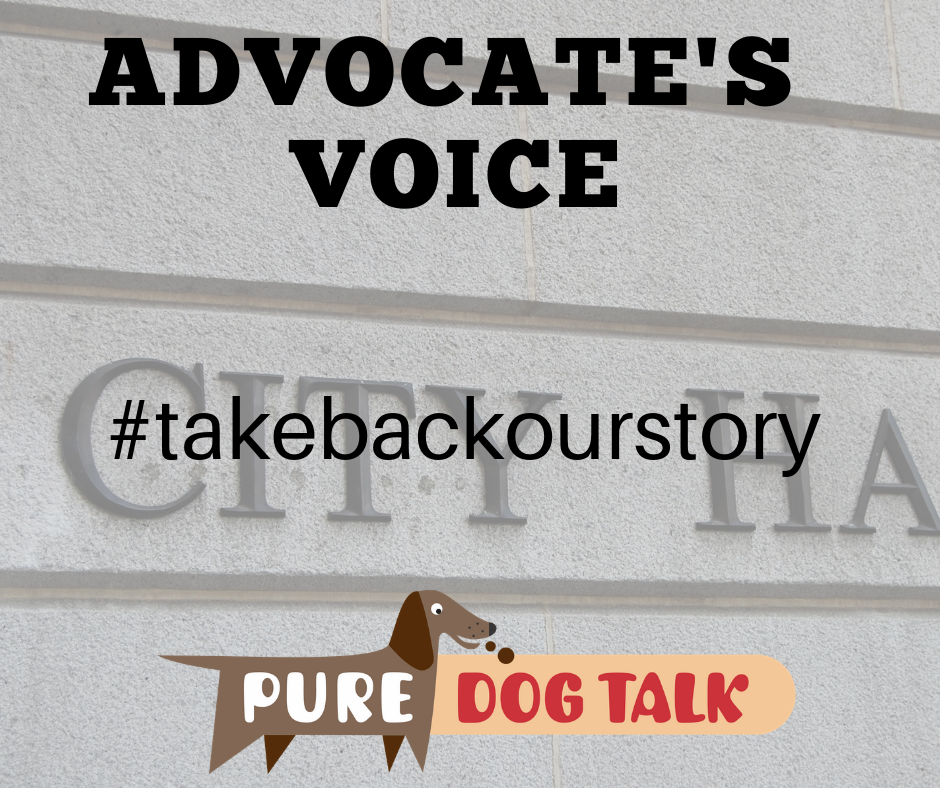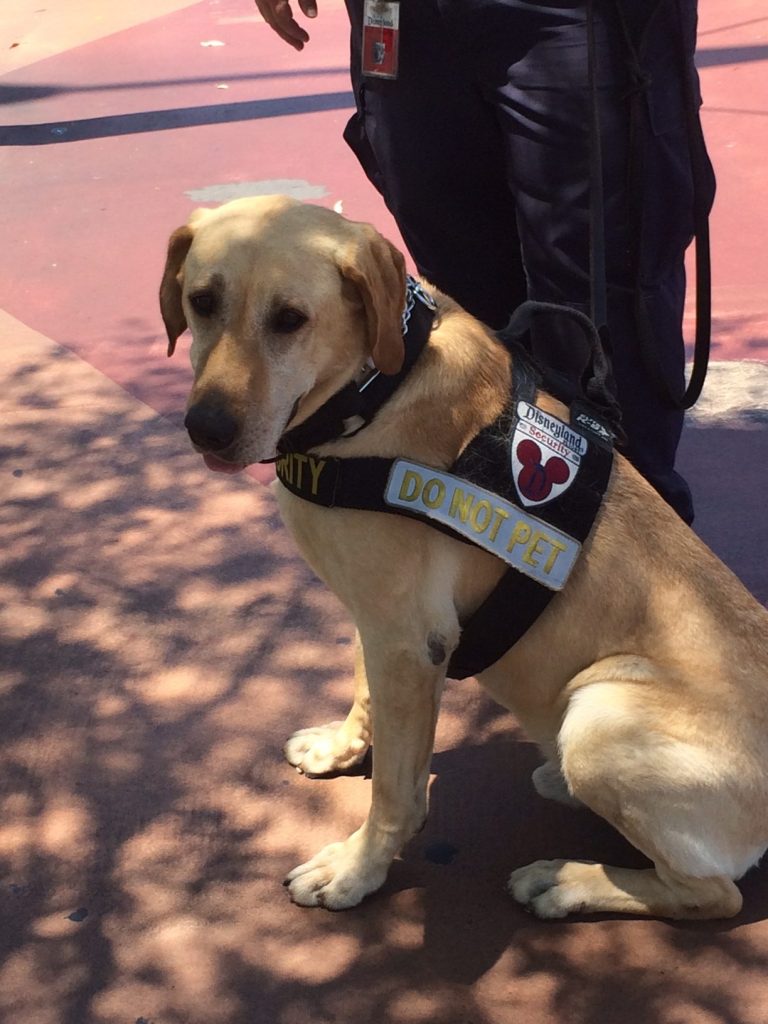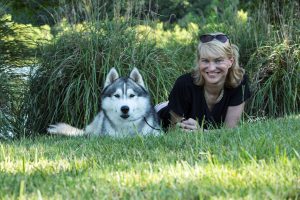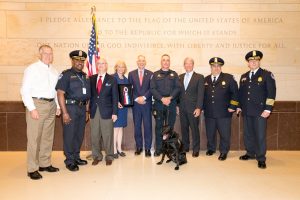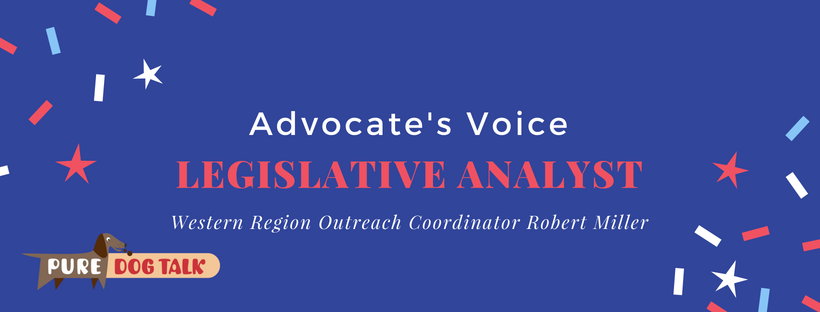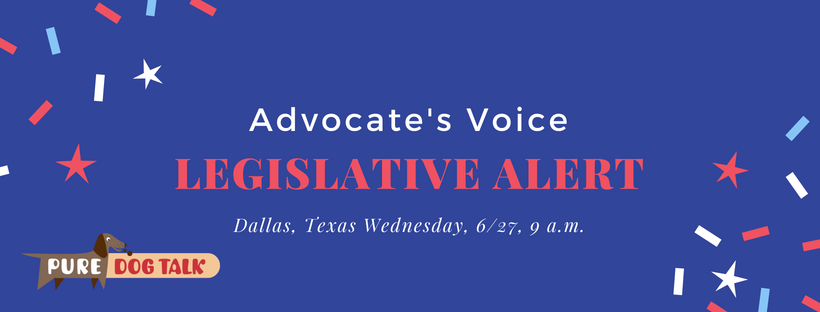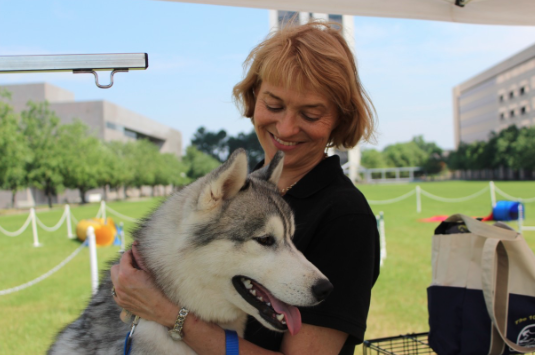265 – #takebackourstory: How YOU Can Help the Fight
#takebackourstory: how YOU Can Help the Fight for Breeders’ Rights
AKC Vice President of Government Relations Sheila Goffe shares details about the Political Action Committee. This fund, administered by AKC, is another tool helping breeders #takebackourstory.
“We are constantly fighting bad legislation,” Goffe said. “One of the things we can do that is the best short cut is make sure the folks who get elected understand us. The PAC provides campaign contributions to people running for office. Our Board looks at candidates who are already in office, people in position to make a difference. People who have worked with us in the past, we want to be sure they get re-elected.”
The AKC PAC makes contributions through YOU, Goffe said. “This is your dollars, but we work with local clubs to invite local people in specific district to deliver the donation. The enables us to develop relationships in the local community with local legislators.”
The reality of money in politics, Goffe noted, is it’s not a quid pro quo. “But when you hand them a check and they know who’s contributing, it gives you an opportunity to be heard. Then it’s up to us. We are the subject matter experts. Many groups writing breeder laws have no experience breeding dogs. We are the experts.”
#takebackourstory
Regulation vs legislation
AKCGR is currently tracking more than 1500 bills nationwide. One of the hotspots of contention is in Ohio.
“There’s a lot of confusion about what’s going on in Ohio,” Goffe said. “Definitions impacting hobby breeders have not changed. We are working with them directly, with the director of Ohio legislature, to ensure that the correct intent of the laws and regulations are adhered to.”
In a shorthand version of the legislative process, Goffe noted that once a bill passes and becomes law, administrators create regulations that implement the law. The people who are determining how the Ohio law is to be implemented are misinterpreting the regulation.
There are a whole lot of reasons that legislation and definitions matter, Goffe said. Proposed legislation needs to be reviewed because even though it may not impact breeders today, the question remains how easy would it be for it to have impact in the future.
“It may not apply to you until it’s “misinterpreted”… the intent of legislators is one thing, then it goes to how is it implemented. The application of the statute can be a problem,” Goffe said.
It matters. Pay attention. 98% of success is showing up.
https://www.akc.org/clubs-delegates/government-relations/toolbox/
https://www.akc.org/clubs-delegates/government-relations/federations/
233 – AKC’s Team Scores on Detection Dog Legislation
AKC’s Detection Dog Legislation Promotes Purpose Bred Dogs
Sheila Goffe, AKC Vice President Government Relations, joins me for a conversation about legislation and the old adage about law making and sausage making.
TSA came to AKC to address shortage of detection dogs in the USA several years ago. Dr. Carmen Battaglia led the development of the Detection Dog Task Force. The first legislation AKCGR worked on in this area was passed last year and required the government to provide a report on comparative expenses of acquiring dogs from overseas for this critical work. (Check out my interview with Mark Dunn from last year on that topic!)
Meanwhile, AKCGR and the Detection Dog Task Force have not rested on their laurels. Goffe has worked for years to establish relationships with legislators and create an “honest broker” reputation that came to fruition again this fall.
Passing new legislation
Congressman Mike Rogers (R-AL) sponsored the Domestic Explosives Detection Canine Capacity Building Act which easily passed the House and then stalled in the Senate. By attaching the bill to a “must pass” funding reauthorization, Goffe and her team were able to assure passage of this new legislation which creates a Public-Private working group to develop a decentralized breeding network.
National Purebred Dog Day/Canines at the Capitol Event in 2017, with the award honoring the US Capitol Hill K9 Corps
Goffe said the very best part of the Congressional hearings was when a New York Congressman stood up and said, “We just need to breed more dogs.” This acknowledgement and support of purpose bred dogs and the breeders who create them at a legislative level is a huge leap forward, Goffe noted, in our ongoing battle to ward off anti-breeder sentiment.
This legislation ensures that US breeders will have access to support in building the best dog for the job of explosives detection. These dogs are high drive, stable minded, physically sound and have intense work ethics, Goffe said.
This team comprised of AKC, TSA, research universities and national experts in training, contracting, breeding will create a baseline of behavioral, medical, and technical standards for explosive detection dogs. Goffe is hopeful this can be accomplished before the end of 2018.
“This effort supports good breeders, is important to national security and is all about purpose bred dogs,” Goffe said.
Allison Foley stops by also with her Tip of the Week from the Leading Edge Dog Show Academy on dryer sheets and how they can be used effectively in the winter months!
197 – Local Legislative Liaison Defends Our Rights
New Legislative Advocate in Our Corner
Robert Miller, AKC’s new legislative analyst and outreach coordinator, is a Wirehaired Pointing Griffon breeder of merit and hunter. His background in legislative work and public information is being put to use on the west coast to provide proactive involvement with fanciers.
Legislation is constantly popping up that affects everyone’s ability to do what they want with their dogs, or even have the dog they want, Miller said.
Fight for your rights
“It’s important to recognize that you have to pay attention to that kind of stuff,” Miller warned. “There’s no one fell swoop that will take away all your dog rights. But you’re going to have a lot of little pieces, chips, death by a thousand cuts. Eventually you’ll say I want to get this kind of dog and you can’t because there is breed specific legislation, which is basically animal profiling. There’s a lot of laws that come up, sometimes well-intentioned, that have unintended consequences.”
Miller’s role is to reach out to fanciers, to encourage them to pay attention and speak up.
“We depend on our dog people. They need to contact us when something pops up at the local level,” Miller said.
Miller encouraged folks to take a look at the Toolbox (https://www.akc.org/clubs-delegates/government-relations/toolbox/) on the Government Relations website.
“Sometimes you have to step out of your comfort zone,” Miller advised. “If legislators know it’s coming from constituents, they pay attention, they listen. Local people carry more weight with legislators than AKC. You don’t have to reinvent the wheel. We can help you develop things that are germane to your specific district.”
It comes down to someone trying to tell you what you can and can’t do with your animals, Miller noted.
“Having animals and using them is a basic human right. People have had dogs for thousands of years. There is this recent sentiment that that is abusive. We believe you should be able to have the dog you want,” Miller said.
Get ahead of the curve
AKC is taking a more proactive approach with this new position.
“Being able to respond quickly is advantageous for all dog owners. I’m visiting local kennel clubs. I’ll do whatever it takes to solve the problem or provide education,” Miller offered. “Make friends with local legislators. They’re people just like you and I. Drop by the office. Get to know who they are. The squeaky wheel really does get listened to. Be civil and get to the point.”
The average legislator is probably not an expert on dogs, Miller observed. “If you are involved with dogs, you know a lot. They (elected officials) like it when someone can share their expertise.”
The people who would like to take our rights away are very active, Miller reiterated. “We need to pull a page out of their playbook. Get proactive. Do things. Run for an office, if that’s something you think you want to do.”
And don’t miss Allison Foley’s Tip of the Week from the Leading Edge Dog Show Academy. Potato starch? Who knew?
SPECIAL LEGISLATIVE ALERT: Speak Up in Dallas, TX
SPECIAL LEGISLATIVE ALERT
Wednesday, 6/27 at 9 a.m., the Dallas City Council will consider a proposal that ALL dogs impounded in the city be altered before being returned to the owner. The current law has exceptions for show and performance dogs. This proposal is seeking to do away with that exception.
Show Up and Speak Up in Dallas, TX
“With the recent incident of a stolen van with show dogs, imagine if those dogs were required to be sterilized before being returned to owners,” said Sheila Goffe, AKC Vice President of Government Relations. “These dogs are the future of our blood lines, the future of our breeds. These are not the dogs that are creating what are legitimate problems in the city.”
AKC Government relations has detailed information available here with location, contact names, numbers and emails, talking points and more.
Goffe noted that responsible dog owners want to be part of the community to help the city with the dog issues it has. “Responsible dog owners aren’t the problem. Going after them isn’t the solution. This is a solution in search of a problem.”
Tips and recommendations from Goffe, most of which are applicable in any similar legislative circumstance:
- You are a resident or you travel through Dallas. You are very concerned about the potential of a dog becoming loose by accident or mishap that you will not be able to have returned intact.
- In 2017, 1100 AKC events were held in the state of Texas.
- 150,000 dogs participated in AKC events in Texas just last year.
- Large dog show weekends bring $1.7 million to community.
- People who have breeding licenses, showing dogs aren’t the problem.
- Spaying/neutering a dog owned by another person can be considered taking property. These dogs are valuable property, we appreciate them being treated as such.
- One size doesn’t fit all.
- First offense. Not an appropriate response.
- Boston and Houston have both considered and decided against this type of proposal.
- Physical bodies are what count. Call instead of email.
- Show up! It makes more of an impact. They need to see, visually, that there are a lot of people out there who care. In an election year, especially, that drives home the point.
- Stand or sit together. Wear clothing or color that makes identifiable as a group. Sign in on a topic. Make it known why you are there.
- Speaking on behalf of xyz kennel club and the x number of members.
- Several bullet points, each person focus on one point – 1-3 minutes to speak. Share a story about how this can impact you personally.
- Be respectful.
- Show reasoned argument why proposal isn’t good for the community.
- Suggest alternative. “We’d like to help you, we have services to offer, invite to dog show. Develop a relationship. We’re the dog experts.”
“Our opponents always have representation at these meetings. It is crucial for us to show up and show the strength of our convictions,” Goffe said. “Many people who are involved in shelters and rescue, their hearts are in a good place. They are under-resourced, understaffed and frustrated. We support the good work of shelters. We just want to explain the difference, the nuance between responsible owners and irresponsible ones.”
106 – Sheila Goffe – AKC Vice President Government Relations: How to Impact
Shiela Goffe, Vice President AKC Government Relations
Sheila Goffe, Vice President AKC Government Relations, provides us with specific, actionable projects to impact the world around us.
Ensure your all breed and parent clubs have Legislative Liaisons – and that your LL’s information is up-to-date with AKC GR.
A Legislative Liaison is one of your club’s most essential links to AKC GR. AKC GR provides important legislative alerts and communications to our liaisons via e-mail, and asks them to in turn share it with their club members. Timely alerts provide notifications of proposals up for consideration, and information on how we can work together to protect your rights. Getting the word out quickly to local dog owners is essential to fighting bad legislation. Learn more about our Legislative Liaison program.
Get involved and be a positive resource for canine expertise in your community.
Join community groups, a political party or similar organizations. Don’t forget that all-breed clubs are also intended to be a resource for the community! Introduce yourself in person, in social media and in writing to local leaders and offer to serve as an expert resource. Whenever you speak with someone on this topic, always follow up. Follow up takes only a minute: a phone call, email, or social media contact. Wherever possible, provide more information of interest that will remind your contacts of the expertise you have to offer. (A link to AKC’s resources on the Economic Benefits of Dog Shows or the impact of dog shows by state and similar expertise can go a long way toward demonstrating your expertise).
Be proud of the great work you do as a breeder/exhibitor/club member and share the love of dogs and your breed with others.
A positive approach can be contagious. Attend town hall meetings with political leaders and bring a positive face to exhibitors and breeders. Know, understand and obey the laws governing dogs that apply to you. Do they need changing? We can help you with that.
Share information about the good things you, your club and AKC does for the community.
Do you teach classes? Provide therapy dogs? Donate to the local shelter? Participate in microchip or health clinics? Compile a list of the good things your club and club members do in the community and be proud to share that information (for examples, see AKC Above and Beyond.) Developing positive relationships with leaders in your community shows them that people who show, breed dogs or own multiple dogs are an asset to the community.
When you become an approachable expert resource, you will likely learn about and have opportunities to weigh in on canine proposals before they become a problem. AKC GR is always available to help you with this. Tips for getting involved and informational resources are available on the GR Toolbox at www.akcgr.org.
Take advantage of AKC resources to provide educational opportunities in your community.
September is Responsible Dog Ownership Month. Is your club holding an event for the public? Even if they aren’t, AKC resources make it easy for you to take important and meaningful actions, such as: inviting local leaders to your dog shows and events, inviting a local official or your local animal control professional to speak at a club meeting, and awarding a legislator of the year or dog friendly community award to leaders and communities that already show they care about responsible dog owners and respect the purebred dog tradition. See www.akc.org/government-relations or akcgr.org for more information about available awards, micro grants for educational activities and other ways AKC can help you get involved in your community.
Learn about the issues!
The Key Issues section of akcgr.org provides succinct information on some of the most common legislative issues that threaten the fancy, purebred dog ownership and breeding. AKC GR Blogs provide details and commentary on some of these issues.
ALWAYS call, send an email, or attend a hearing if you receive an AKC legislative alert.
AKC GR’s targeted alerts are distributed only to communities directly impacted by issues, and we rely on legislative liaisons to help deliver those alerts. AKC GR provides sample letters and step-by-step information to make this process easy. Always be respectful and professional in your communications. If you get a personal response from a legislator, we’d love to hear about it. More tips and instructions for communicating with legislators is available online and in these guides: Communicating Effectively with Legislators, Make Your Contact Count.
Our job is to be a resource for you! Please don’t hesitate to contact us directly at 919-816-3720 or doglaw@akc.org if you have any questions or need assistance on a legislative/public policy issue.

